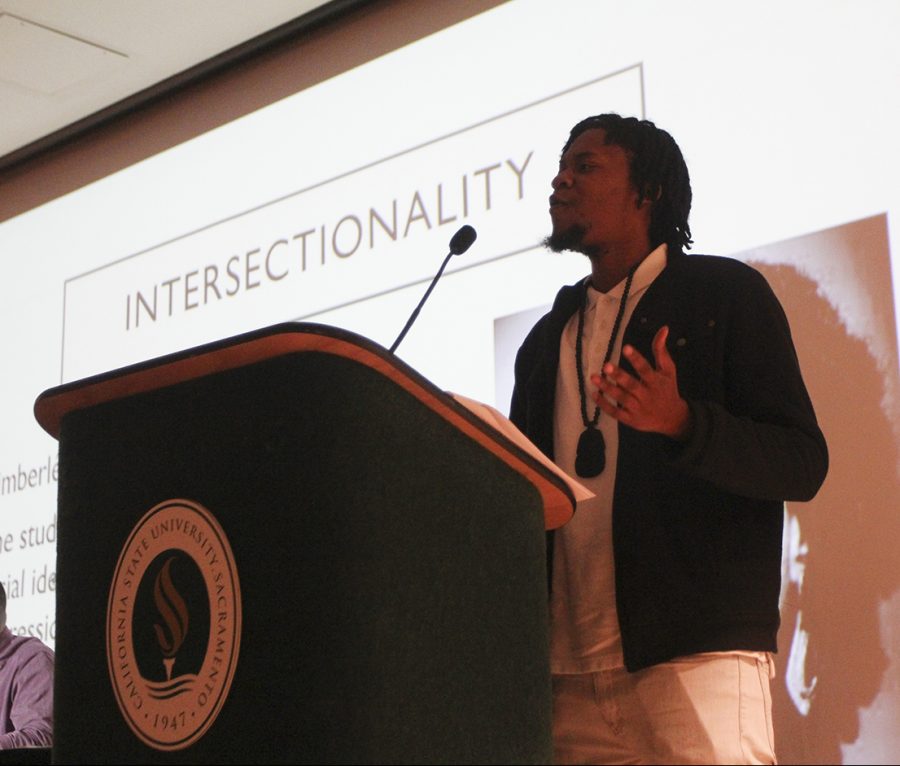A panel of Sacramento State students and faculty met on Wednesday in the Hinde Auditorium to discuss how to create a more empathetic and inclusive campus, citing the need for inclusiveness as especially important after statements made by President-elect Donald Trump.
Topics raised by the panel included campus hate crime policies and procedures, diversity in higher education, undocumented students and police militarization.
Panel member Andrea Moore, an assistant professor in the ethnic studies department, addressed issues with Sac State’s handling of hate crime policy and procedures.
“What happens when a hate crime happens on this campus? How do students report it? What’s the protocol? What’s the policy? What’s the punishment?” Moore asked. “(The Clery) report did not address any punishment or even any protocol of what happens after a hate crime happens on campus. So maybe that’s why there’s been nobody (who has) reported a hate crime in 2013 or 2014 or 2015, because the report I’m reading — it doesn’t tell me what happens if a hate crime does occur on campus.”
The Clery Report is mandated by a 1990 federal law that requires colleges and universities that receive federal financial aid to provide information about crimes that occur on or near campus.
The 2016 Clery report for Sac State stated that no hate crimes were reported in 2013, 2014 and 2015. The report defines hate crimes as crimes that “manifest evidence that the victim was intentionally selected because of the perpetrator’s bias against the victim” because of their race, gender, religion or sexual orientation among other characteristics.
Moore brought up the Office for Equal Opportunity (OEO) as a place for students, faculty and staff to bring “complaints of discrimination, harassment and retaliation.”
However, Tina Jordan, the director of the Peer and Academic Resource Center (PARC) and co-organizer of the event, said that she has heard student complaints “washed away” by the OEO.
“I have had students go to this office before, and sometimes the complaints kind of get washed away, like ‘Oh there wasn’t enough evidence,’ ” Jordan said. “I’ve seen it even for … sexual harassment in the classroom … A lot of students — they tell their story, and it just gets washed away.”
Moore said that she wants clearer practices and policies relating to hate crimes.
Graduate sociology student Brent Clark, who organized the event along with Jordan, talked about empathy in a university setting.
“College can really expand who you know; that’s why college can play such a huge role in the establishment of empathy,” Clark said.
Clark related this to his experiences with inclusiveness and empathy during the Ferguson protests, saying that he was unaware of the plight of African-American women and transgender people.
Clark also urged students to actively voice support for professors who were inclusive.
“We’re all doing course evaluations as students, right? If you have a professor who does a good job of being inclusive, who does bring in other texts, don’t just fill it out,” Clark said. “Actually write that, actually go to the dean of the department and say ‘Hey, professor such-and-such is an excellent professor, they create an inclusive environment,’ because if we don’t do that, then those professors are going to disappear.”
Norma Mendoza, a project coordinator for the Serna Center and Dreamer Resource Center, stressed empathy for undocumented students.
The Dreamer Resource Center helps undocumented students and students with mixed-status families graduate by providing information workshops and scholarships.
“To me, empathy is if you realize that they’re just like you, and you’re just like them,” Mendoza said. “I think now more than ever, our undocumented students are going to require that we’re empathetic of them, and one way that you can do that is to keep that in mind and to think about the privilege that we have.”
Mendoza believes that Sac State’s undocumented student population is between 600 and 900, based on data from the California Nonresident Tuition Exemption (AB 540) and California Dream Act applications provided by the Office of Financial Aid.
AB 540 requires that colleges keep the immigration status of students confidential and allows students who have met certain requirements to pay in-state tuition while the California Dream Act allows students to apply for private scholarships and state aid.
Mendoza said that the Dreamer Resource Center has been busier than usual since last month’s election.
“I have students that just come up to me … and they’re like ‘I looked you up, I wanted to see what Sac State had to offer, because I’m scared about what’s going to happen to me, I’m scared about my future, I’m not sure if I’m going to be able to stay here at Sac State.’ ” Mendoza said.
Aaron Jackson, a PARC tutor, discussed the importance of empathy relating to the police, drawing on his background as a veteran of the war in Afghanistan.
“We’re repurposing not only our military equipment, we’re repurposing our military personnel — personnel who, by the way, are trained to be hyper-aggressive because that’s necessary in war.” Jackson said. “Police have to be part of their community. They have to empathize and sympathize with their community. They have to understand who they’re serving.”
In a summation of the night’s event, Clark emphasized empathy and interacting with other students.
“Next week we’re all going to be dead — it’s about to be finals, and it’s going to be stressful. No matter what your identity is, no matter how privileged you are, finals week sucks,” Clark said. “So if you can connect with someone on that level, then maybe you can see past the fact that you’re not familiar with their religion, or you’ve never met anyone who identifies with their sexual identity, or whatever may be, because you’re both trying to pass that damn class. … so maybe we’re not also that different in the long run
























































































































Don Honda • Dec 5, 2016 at 6:47 pm
The Dreamer Resource Center is unconstitutional as in “Separate, But Equal.” Vets, other students besides Illegal Aliens, and re-entering adults, cannot use this facility. It also caters to Illegal Aliens not matriculated, using State funds deceptively.
Is this what to expect from DREAMers?:
http://www.sandiegouniontribune.com/opinion/commentary/sdut-ruben-navarrette-one-dreamers-missed-lesson-2015jun24-story.html
Ruben Navarrette: One Dreamer’s missed lesson in good character